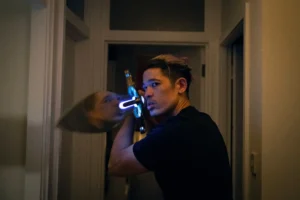Summary
Swallow has an uncommon raw power that most films can’t reach.
I recently wrote a review of Netflix’s Lost Girls where I referenced a line used by Aaron Sorkin in The West Wing: “The things we do to women.” That perfectly sums up a decade co-defined by the #MeToo movement (along with Black Lives Matter) that has influenced so many films this decade. Boy, should I have waited a week to use it? Carlo Mirabella-Davis‘s film Swallow perfectly blends the horrors at the hands of men, and the overall power loneliness has on us.
The protagonist of Swallow is Hunter Conrad, played by Haley Bennett (The Red Sea Diving Academy, The Girl on the Train), in a turn that might skyrocket her career as a newly pregnant housewife who has it all. She has a handsome and successful husband, Richie (Bridge of Spies’ Austin Stowell), and she married into a wealthy family. The endless days of sitting at home and getting dinner ready for her husband are lonely, so much so she is grateful for an invite for tea from her judgmental mother-in-law Katherine (Manifest’s Elizabeth Marvel). The latter’s husband, David (Succession’s David Rasche), controls the purse strings to keep everyone in line. She soon finds out she is pregnant, which makes her subsequent decisions puzzling — she finds herself drawn to swallowing dangerous objects like batteries, marbles, and even thumbtacks to deal with her unspoken secret from her past.

Mirabella-Davis also wrote the script, and it perfectly blends the power loneliness has when left to your thoughts for long periods and the horrors the emotional damage women do suffer at the hands of men. His film is so much more than the self-mutilating horror film that most would want to pin on it from its trailer; it’s a psychological thriller that builds as you watch it through your fingers, and you may even have to pause it to give yourself a break.
The film is perfectly cast here, with Bennett giving a performance that modernizes the Mad Men housewife to Stowell’s yuppie husband, who looks at her as nothing but as a storage unit for his child and as much of an inanimate object as the ones Hunter swallows. The film’s final act has multiple themes operating beneath the surface. Bennett’s restrained suffering comes pouring out in a show-stopping moment, along with an equally award-worthy turn by one of the great veteran character actors Denis O’Hare. Even the scene, as written, is so different than how most of its ilk would play when the standard act of revenge would be part of the playbook here. It leaves the viewer satisfied with closure, which is remarkable.
Swallow has an uncommon raw power that most films can’t reach. It’s hard to believe this much was accomplished here with a storyline so simple, but that’s what the best artists can do — expressing anything with a single look or frame without speaking a word. When you break it down, Mirabella-Davis’s film is really about a woman taking back control of what goes into her body and breaking free of the prison we put ourselves in that doesn’t necessarily need physical steel bars to keep us there.



